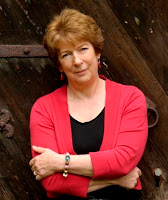after another, and when I’ve seen them all
I will read all the bad books, the bad, rubbishy
books with their stock characters and ridiculous plots,
I will read all the bad books, the bad, rubbishy
books with their stock characters and ridiculous plots,
and then I will listen to Europop—
no, country music, I’ll listen to Europop and country music
no, country music, I’ll listen to Europop and country music
and the entire back-catalogue of Celine Dion while I eat
triple cheeseburgers, grease running down my chin.
triple cheeseburgers, grease running down my chin.
I want to grow fat and to start smoking.
I want to stub out my cigarette in a fried egg,
I want to live in that Hitchcock movie,
I want to stub out my cigarette in a fried egg,
I want to live in that Hitchcock movie,
which isn’t a bad movie at all, but more like the ones
we watched when we watched movies,
we watched when we watched movies,
not art-house exactly, but VistaVision kitsch—
how we loved the beautiful actors, their quick,
brittle voices, their antique brio. We grasped
their warm hands. The room filled with snow.
brittle voices, their antique brio. We grasped
their warm hands. The room filled with snow.
Editor: Harvey Molloy
I find Tim’s poetry especially interesting because it continues to change and evolve. If you’ve read his book House on Fire you’ll be familiar with poems such as the incredibly controlled ‘The Starlings’ which begins:
Anger sang in that house until the scrim walls thrummed.
The clamour rang the window panes, dizzying up chimneys.
Get on, get on, the wide rooms cried, until it seemed our unease
as we passed on the stairs or chewed our meals in dimmed
light were all an attending to that voice. And so we got on,
and to muffle that sound we gibbed and plastered, built
shelves for all our good books. What we sometimes felt
is hard to say. We replaced what we thought was rotten.
I find Tim’s poetry especially interesting because it continues to change and evolve. If you’ve read his book House on Fire you’ll be familiar with poems such as the incredibly controlled ‘The Starlings’ which begins:
Anger sang in that house until the scrim walls thrummed.
The clamour rang the window panes, dizzying up chimneys.
Get on, get on, the wide rooms cried, until it seemed our unease
as we passed on the stairs or chewed our meals in dimmed
light were all an attending to that voice. And so we got on,
and to muffle that sound we gibbed and plastered, built
shelves for all our good books. What we sometimes felt
is hard to say. We replaced what we thought was rotten.
Tim’s work has a strong musical quality. Sometime during the writing of House on Fire Tim started to read the poems of Frederick Seidel and the music of his poetry changed – the effect on Tim’s work was akin to the effect The Sex Pistols performance at Manchester Free Trade Hall in June 1976 had on northern music: a new brash broom sweeps clean. However, as you can see, in Tim’s case the musician is classically trained and capable of virtuoso performances.
This poem by Tim first appeared in Turbine 2011 and won the Bronwyn Tate Memorial International Poetry Competition that year. Tim is writing his PhD thesis on the poetry of Frederick Seidel. His poems have been published widely in literary journals and mainstream magazines in NZ and the US, and recently in anthologies such as Turbine, Best NZ Poems (VUP) and Villanelles (Everyman). He reviews books, and blogs at A Spurred Word.
When we watched movies is posted here with permission.
When we watched movies is posted here with permission.
There are more poems in the sidebar with our poets from NZ, Australia, the UK and US. Thirty in all.
This week's editor, Harvey Molloy is a Wellington teacher who has published poems in a number of journals including Enamel, International Literary Quarterly, Landfall, NZ Listener, and Poetry New Zealand. His first book of poems, Moonshot, was published by Steele Roberts in 2008. He is the co-author of the book Asperger Syndrome, Adolescence, and Identity: Looking Beyond the Label, and is working on a second book of poems. He blogs here.
This week's editor, Harvey Molloy is a Wellington teacher who has published poems in a number of journals including Enamel, International Literary Quarterly, Landfall, NZ Listener, and Poetry New Zealand. His first book of poems, Moonshot, was published by Steele Roberts in 2008. He is the co-author of the book Asperger Syndrome, Adolescence, and Identity: Looking Beyond the Label, and is working on a second book of poems. He blogs here.







